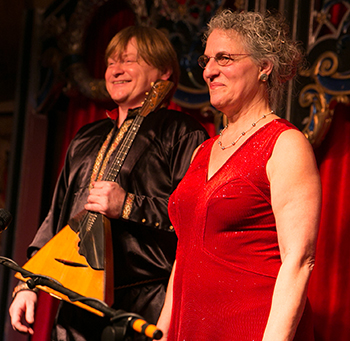by Mike Telin

On Thursday, March 28 at 7:30 pm at Nighttown, Russian Duo (Oleg Kruglyakov, balalaika and vocals, and Terry Boyarsky, piano) will present a program that includes the Duo’s arrangement of Dykstra’s Free Spirit Rag, as well as variations on Russian folk melodies, classical music, and Soviet compositions. Prior to the performance there will be a screening of director Chris Bohan’s and cinematographer Steve Hacker’s short film You Go First, which features music performed by Russian Duo. Tickets are available online.
Dykstra did send the music to Boyarsky and Kruglyakov, and gave them permission to make the arrangement. “Some months later Terry invited me to her house for dinner,” Dykstra said. “
Oleg was there and they played the arrangement for me. In my opinion it is much more than an arrangement, it’s more like a re-composition of the piece in a fascinating way. They’ve added some counter melodies and rearranged the accompaniment. They’ve divided the leads between them, so there’s always something interesting going on in both parts.”
What was Dykstra’s first impression when he heard the work played on balalaika and piano? “Weird and bizarre, and wonderful,” he said. “I was fascinated by it and look forward to hearing it again.”
Dykstra taught full-time at The College of Wooster from 1969-2007, and since then has continued to teach on a part-time basis. He has been lauded for his 64 concert rags, and in 2012 released Neo-Ragtime on the Centaur label. His second Centaur CD, Ragtime Classics, 1901-1919, was released in early 2014.
Although he is a classical pianist, Dykstra said that he always admired jazz, and often wished that he had some music to play that would reach a wider audience. Then, in late 1971, he began performing Scott Joplin’s Maple Leaf Rag as an encore piece.
“This was at the time that Joshua Rifkin was releasing his recording of rags, and The New York Public Library was publishing the works of Joplin — I quickly got on to those and works by other composers of rags.”
During that time, he also began composing his own rags. “By the end of 1972 I played my first full program of ragtime music at the College of Wooster. It was obvious that a lot of people liked the music, and over the next decade I presented a lot of those programs.”
Dykstra described his own rags as a little more complicated and dissonant than classic rags. His interest in composing them soon evolved into writing rags for small ensembles, including his Two Rags for Bassoon and Piano — written for David McGill and later recorded by Barrick Stees — five for flute and piano, one for clarinet and piano — recorded by Robert Woolfrey — and one for the Cleveland Duo and saxophonist James Umble. “I even composed one for chorus and piano for an anniversary of the founding of Wooster.”
Although many composers wrote rags, including Stravinsky, Gershwin, Ellington, and Hindemith, Dykstra credits the 1970s revival of Joplin for moving the genre into classical music. “Rags are all over the world,” he said. “I have students from China who know them.”
Published on ClevelandClassical.com March 26, 2019.
Click here for a printable copy of this article


